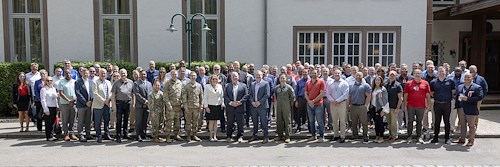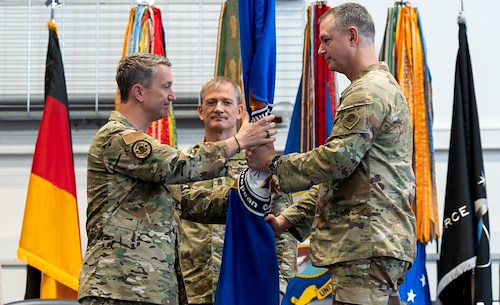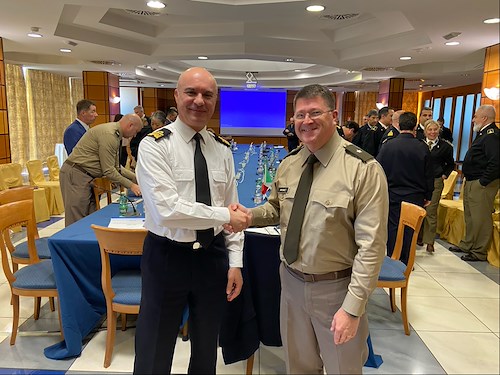(JOINED IN PROGRESS)
UKRAINIAN PRESIDENT PETRO POROSHENKO (THROUGH TRANSLATOR): -- you for keeping your promise in our arrangement that we had in Pentagon during my visit to Washington. You promised me that you would come to Ukraine in celebration of the independence day.
And today, we have this important and symbolic -- (inaudible) -- which is broadcast on the visit of the Secretary of Defense of the United States, that we haven't had for 10 years. This is the year (inaudible) for celebration of the independence day, your participation in the military parades.
And today, when the representatives of our allied countries, together, Ukrainian military servicemen marched in the parade, testifies our unity and our solidarity.
I'm still under impression, after our meeting on the American soil, as for the level of trust, the understanding, the candid nature, the fairness and (inaudible) of our dialogue -- and really, from the first minutes of my visit in Washington, experienced that and felt that Mr. Secretary is a real and genuine friend of Ukraine.
That is very symbolic that, among the number of (inaudible) in the office of the secretary, the (inaudible) time was just in front of them -- of him that prioritize the cooperation of Ukraine.
During today's negotiations, we touched upon the counteraction against the aggression of the Russian Federation against Ukraine, and that was the key topic and our common challenge. I kept Mr. Secretary informed about the security situation in the region.
You may well be aware of that, the day before yesterday, I came back from Donbass. We had the meeting with representatives of the OSCE in (inaudible) town. And we had a very important telephone talk in Normandy format after that. And we have reached an agreement, and the proposal of Ukraine has supported that, starting from today, the 25th of August, to declare the ceasefire, and on that occasion, in the Normandy format, we issued public statement.
We rely on the very responsible position of the Russian Federation, as for the strict confines for the ceasefire regime. I would like to thank Mr. Secretary for the clear support of the U.S. administration of the sovereignty and territorial integrity and independence of our country. It's an absolutely clear (inaudible).
I want to emphasize that the fact that Mr. Volker is present in Ukrainian negotiation as special envoy of the United States on Ukraine is another confirmation of the very substance and the concrete nature of our talk and our negotiations.
And, availing myself of this opportunity, I would like to extend -- the -- to welcome the decisiveness of Mr. Volker's attempts, and we hope on your great support in this case and --
(AUDIO GAP)
PRES. POROSHENKO (THROUGH TRANSLATOR): -- we hope for your very (inaudible).
I want to say that, if Moscow does not want to waste another chance on our negotiations, I'm confident that Moscow should keep the logics which is observed by all participants of the Normandy format first.
This is the implementation of the security package, ceasefire, withdrawal of all Russian forces and hardware from occupied Donbass -- (inaudible) -- to ensure the immediate halt of hardware and forces (inaudible) into the Donbass territory, and force to ensure the access of the OSCE observers on the whole territory of Donbass, including the territory which is not controlled by the Ukrainian government. It’s also very much important to de-block the release of hostages.
PRES. POROSHENKO (THROUGH TRANSLATOR): As of today, we verified 130 hostages present, and you may know that, in Donetsk, I had the meeting with the relatives of the hostages both in the occupied territory, as well as in the territory of the Russian Federation. And we demand immediate progress on the release of hostages.
Last, but not the least, we exchanged our views with Mr. Secretary as for the presence of the international troops in Donbass. We are talking about the deployment of possible peacekeeping operations of the United Nations with a mandate of the U.N. Security Council in certain regions of Donetsk and Luhansk (inaudible). We stress that such presence would facilitate the security, and to get back on the political track of the Minsk process.
Of course, the -- it will not be complete if we have not touched upon the issue of the Crimea. I'm grateful to Mr. Secretary for the clear and (inaudible) position. Crimea has been, is, and will remain Ukrainian territory -- belongs to Ukraine and it should come back to Ukraine.
There is no other way to stop -- (inaudible) -- the territory of non-freedom into the military base does not exist. I express my gratitude to the U.S. administration for the last restricted measures, which confirm that the United States (inaudible) to be the leader in the transatlantic front of centuries.
And we hope that the Kremlin will heed to the international community, will stop its hybrid provocations and will facilitate stabilization. Otherwise, I say that that price of the aggression will be higher, though I would like to say also that sanctions is not a name in itself, but just a tool, an instrument to get Russia back at the table of negotiations and to secure the complete implementation of the Minsk process.
I'm confident that this is the only possible way for the situation development for us. Today, we continue talking about the different support of Ukraine, about the strengthening of the existing military cooperation, and I thanked our American partners, first of all, for their military assistance that we have had from the first minutes of the aggression.
We are very satisfied with their level of preparation of the Ukrainian servicemen, their support, our advisers and defense and security region. We agreed to make it also on the operative level, in the framework of the transatlantic cooperation and the framework of the NATO cooperation and the cybersecurity and -- against cyber crimes, and on many other issues.
I would like to say that Ukraine, being the country which renounced the third largest nuclear arsenal, which has unique technologies on rocke building -- we strictly keep our undertaken obligations. And it is important for us that the safeguards that Ukraine -- Ukraine received in the framework of the Budapest memorandum are complied with.
I would like to touch upon approaches that we share, proposed by President Trump, a new strategy of the United States regarding Afghanistan.
On our side, we confirm -- I confirmed the contribution to the realization of this strategy in the interest of the peace and security.
Time and again, Mr. Secretary -- I would like to thank you for your visit, for your presence and for your participation in the military parade in Ukraine. This is the position of the real and genuine friend of Ukraine.
Thank you very much indeed.
SECRETARY OF DEFENSE JIM MATTIS: Well, good afternoon, ladies and gentlemen. And what a day. This is a day that's going to live long in my memory, to feel the refreshing sense of independence, of freedom, and a reminder to me, as an American, not to take something for granted, because our country's had it so long.
But, Mr. President, it's an honor to stand alongside you on your independence day. Have no doubt the United States also stands with Ukraine in all things. We support you in the face of threats to sovereignty and territorial integrity, and to international law and the international order writ large.
We do not, and we will not, accept Russia's seizure of the Crimea. And despite Russia's denials, we know they are seeking to redraw international borders by force, undermining the sovereign and free nations of Europe.
Russia put its reputation on the line when it accepted the Minsk ceasefire agreement, which called for an immediate ceasefire, withdrawal of all the heavy weapons, and to grant the Organization for Security and Cooperation in Europe unfettered access under the Minsk agreement.
In 1994, Russia signed the Budapest memorandum, as the president said, and alongside the United States, the United Kingdom and Ukraine. And that provided Ukraine with assurances that all parties -- all parties would respect its independence, its sovereignty and its existing borders.
And in that memorandum, Russia also promised to refrain from the threat or use of force in exchange for the Ukraine's relinquishment of nuclear weapons. Once again, under the 1997 NATO-Russia Founding Act, Russia agreed to refrain from the threat or use of force against each other or any other state, its sovereignty, territorial integrity, or political independence.
Unfortunately, Russia is not adhering to the letter, much less the spirit, of these international commitments. The U.S. and our allies will continue to press Russia to honor its Minsk commitments, and our sanctions will remain in place until Moscow reverses the actions that triggered them.
As President Trump has made clear, the United States remains committed to diplomatic efforts to resolve the conflict in eastern Ukraine. And I, too, am especially pleased to be here today with Ambassador Volker, the U.S. special representative. Ambassador Volker is coordinating carefully with our allies, as well, on these efforts.
As Secretary Tillerson, our secretary of state, said in July, "The United States' goals are to restore Ukraine's sovereignty and territorial integrity, and to seek the safety and security of all Ukrainian citizens regardless of nationality, ethnicity or religion."
We in the United States understand the strategic challenges associated with Russian aggression. Alongside our allies, we remain committed to upholding the widely accepted international norms that have increased global stability since the tragedy of World War II.
Mr. President, we continue to support Ukraine and remain committed to building the capacity of your armed forces to defend their country and to defend -- protecting the Ukrainian people.
We applaud the Ukraine's commitment to reform and to modernize its defense sector according to NATO standards. This will make Ukraine's forces more operationally effective, as well as more effective protectors of the Ukrainian people. And we look forward to the full implementation of NATO standards in the midst of this conflict you're currently fighting.
The United States and Ukraine are cultivating a lasting strategic partnership, already 25 years in the making, built on common security interests and shared principles.
I look forward to continuing to build on that partnership, which we strengthened in June, when President Trump hosted you, Mr. President, at the White House, and we reinforced today during our meetings, here in the beautiful, historic city.
Thank you again, Mr. President.
PRES. POROSHENKO: Thank you. Thank you, -- (inaudible).
STAFF: Now it's time for questions. One question from each side. First goes to Ukrainian side. (Inaudible).
Q (THROUGH TRANSLATOR): I'm -- (inaudible) -- from Ukrainian news. My question, Mr. -- Mr. President and Mr. Secretary of Defense, is about your discussion around strengthening the defensive systems for Ukraine. Did you discuss the possibility of providing --- the defense -- defense or lethal weapons to Ukraine? Can we expect this kind of decision from the United States?
And eventually, which of the factors (inaudible) final decision? And especially, I'd like to ask Mr. President -- (inaudible) -- did you have discussion with Mr. Surkov? What were his impressions? What were the results of your meetings with Mr. Surkov? And what will be the further steps of the United States to force the Minsk process?
PRES. POROSHENKO (THROUGH TRANSLATOR): If you allow, I will start. Well, really, we talked all sides of our cooperation with the United States of America, including rendering to Ukraine -- the enlargement of our defense capabilities, cooperation, and military and technical sector.
I would divide this question into two parts. First part, really, yet back during my visit, we agreed that we would have a very active dialogue regarding the defense capabilities of Ukraine. It's not about only the rendering of lethal weapons, but the (inaudible) of defense capabilities: radio electronic defense, the means which intensify the capabilities of our defense forces.
Well, talking over these issues requires silence. Today, I would abstain from commenting on the topic -- on these issues. But I would like to stay that, being the president of Ukraine, I'm satisfied the level of power, negotiation and preparation. We see a clear-cut position of our strategic partner and ally, the United States of America, and I'm very satisfied as the president of Ukraine.
And regarding Ambassador Volker, I would like to welcome the activities of Ambassador Volker. I would like to say that we are very much satisfied with the appointment of such an experienced analyst diplomat.
And I'm sure that (inaudible) cooperation that we are having today at the level of the Ministry of Foreign Affairs, the representatives of my administration can testify to a very high activity of Mr. Volker, including during the meeting with Mr. Surkov.
SEC. MATTIS: Regarding the relationship that we have -- the strategic relationship, I believe that no relationship stays the same. It either gets weaker or stronger. And by being here, I'm making a statement that we intend to strengthen the relationship between our two countries. I need to come here and to better understand the situation your soldiers face on the front lines.
This permits me, better informed, to go back and advocate for what I believe you need, as brought to me by your minister of defense and, certainly, your president. For example, we've just approved -- just very recently, last couple of weeks, another $175 million worth of equipment, including some specialized equipment that can be used to help defend the country, bringing to a total of nearly $750 million in the last several years.
So we are in this very, very much in support of you. I would also point out that, on the defensive lethal weapons, we are -- we are actively reviewing it. I will go back, now, having seen the current situation, and be able to inform the secretary of state and the president in very specific terms what I recommend for the direction ahead.
Thank you.
STAFF: And a question from American side, New York Times, please.
Q: Thank you. I would like to -- Michael Gordon, New York Times.
I would like to take another crack at that question that was just asked. First, for Secretary Mattis, you made some very strong comments here about Russian aggression and supporting the Ukrainian armed forces, and the previous question was about what actions are going to come from the United States.
And it's been reported already in the United States that the State Department and the Defense Department do support the provision of Javelin and defensive lethal arms to Ukraine, and that the matter is before the White House. And it's -- the question is, will President Trump, himself, support it?
My question is, do you, as a matter of principle, believe that providing defensive lethal weapons like Javelin to Ukraine can raise -- increase deterrence with regards to Russia? Or do you accept the Obama administration's argument that such measures could be provocative?
And for President Poroshenko, you discussed the ceasefire. For an international audience, could you please tell us, in your estimation, how many Russian forces are currently in eastern Ukraine and what specific steps you would like to see the Russians take in coming days?
Thank you.
STAFF: Thank you.
SEC. MATTIS: Michael, defensive weapons are not provocative unless you're an aggressor, and clearly, Ukraine is not an aggressor, since it's their own territory where the fighting is happening.
As far as my discussions with the commander in chief, with the president, I owe him some confidentiality on that. So I prefer not to answer that right now.
STAFF: Mr. President?
PRES. POROSHENKO: I only can support what the secretary said: that, first of all, we demonstrate very high level of responsibility when we have any defensive opportunity, including what we have from the United States.
First of all, we have our own anti-tank weapons and the -- having discussion about the supply to Ukraine -- any defensive weapons, it would be just to increase the price if Russia make a decision to attack my troops and my territory. And that would be strong motivation to stop them from the very irresponsible step. I can consider that exactly like this.
At the same time, I thank you for your question about the importance of the ceasefire, so-called "back-to-school" ceasefire, which was approved on the Normandy format phone conversation, and what specific steps we're waiting from Russia.
Point number one, to withdraw Russian troops. And the information of our intelligence, confirmed by our partners: minimum number of Russian troops now -- regular troops now being on the occupied territory is about 3,000.
And among 39,000 of the troops which are on the occupied territory, we have also Russian commanders, starting from the platoon, company, and battalion commander, all of them representing -- not representing members of the Russian regular troops.
From one point, this is extremely dangerous. From the -- another point, we can find out, even, something positive, that they are very well-operated by Russian Federation. And that's why they rising up at the same time -- the responsibility of the Russian Federation, and Russian ability to keep the ceasefire.
And, practical step, again, withdraw Russian troops; provide the uninterrupted access of the special monitoring mission of OSCE to the whole territory, including the border; withdraw and hold and stop the supplying new armament through the uncontrolled part of the Russian border; and the progress in releasing the hostages.
This is the first step of the security package, which we are expecting immediately, and the progress for the international presence, including the possible presence of the U.N. peacekeepers, which would be a guarantee for fulfilling the obligation which would be reached in implementation of Minsk agreement.
Thank you.
STAFF: Thank you very much.
Thank you very much, indeed.




